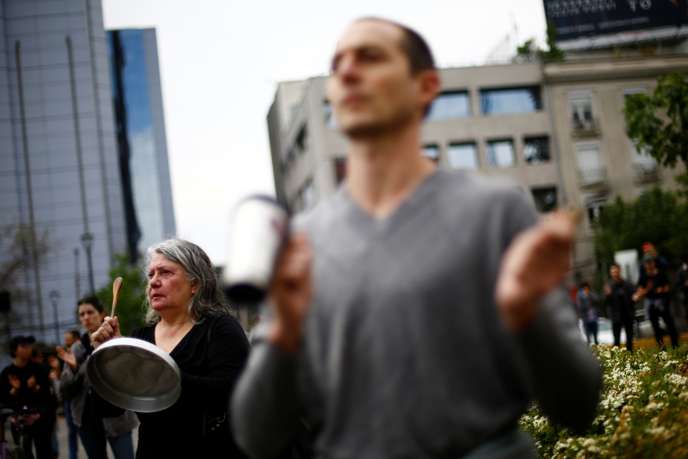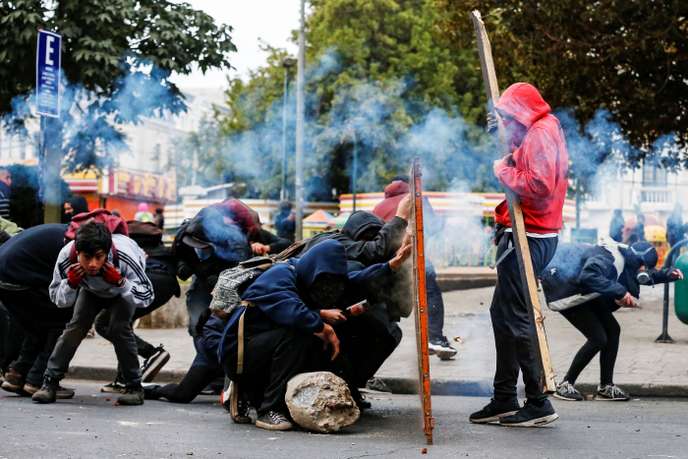This increase is causing, since Friday, riots that made three deaths in the capital Santiago, where a curfew was decreed.

Faced with the scale of the damage and the protest movement, the Chilean president has decided to back down. Sebastian Pinera announced on Saturday (October 19th) the suspension of the price increase of metro tickets in Santiago, which has been the cause of a strong social protest in the capital for two days.
"I want to announce today that we will suspend the metro rate increase", said the president from the presidential palace of La Moneda, shortly before the general appointed to ensure the security of the city announces a total curfew in Santiago in response to "Excesses that happened today".
Clashes between protesters and police began again Saturday, the day after the establishment of the "state of emergency" in the capital, shaken by a protest against rising transport prices. The events caused three victims, dead in the fire of a supermarket that was ransacked in the night from Saturday to Sunday.
Thousands of people had gathered for a pot concert, a mode of protest that appeared after the coup led by General Augusto Pinochet at the end of 1973, but the demonstration quickly degenerated into clashes between masked people and special forces. In particular, clashes have been reported on the main square of Italy, the epicenter of the protest, and near the seat of government, as well as in Puente Alto, in the southern suburbs of the capital. Buses were set on fire in the city center, and the authorities decided during the day to completely stop their traffic.

Sebastian Pinera decreed in the night from Friday to Saturday the" emergency state " for fifteen days in Santiago and entrusted to the general Javier Iturriaga del Campo the responsibility of ensuring security. Soldiers thus patrolled Saturday in Santiago, for the first time since the return to democracy, in 1990.
"Fed up with abuse"
Thousands of people, however, came down the streets of the capital and other cities to make pans resound. Demonstrations have also been held in major cities on the Pacific Rim such as Valparaiso. In this port, 120 km west of Santiago, dozens of protesters set fire to the headquarters ofEl Mercurio, the oldest newspaper in the country, according to television pictures.
In Santiago, in front of the soldiers deployed on the Place d'Italie in Santiago, demonstrators carried pictures of persons who disappeared under the military dictatorship (1973-1990), which resulted in more than 3,200 dead or missing.
With slogans such as "Fed up with abuse" or "Chile woke up", broadcast on social networks, the country faces one of the worst social crises for decades. This was triggered by the mere announcement of an increase in the price of metro tickets, from 800 to 830 pesos (about 1.04 euros). The claims then quickly spilled over into other topics, such as health or education.

General Iturriaga del Campo said that the army would patrol the capital, which has seven million inhabitants. In view of the extent of the damage on Saturday, he declared a total curfew of 22 hours to 7 hours local, without specifying the number of days during which this measure will apply.
State of emergency and curfew were then extended to the region of Valparaiso (center) and to the province of Concepcion (south), announced local authorities.
A country "pressure cooker"
A photo of President Sebastian Pinera quietly enjoying a pizza in a restaurant while Santiago burned increased the anger of the population, in a country where relative calm reigned in recent years. Visibly caught out by this crisis, Mr. Pinera had described his country, just a few days ago, "Oasis" In the region.
"It's sad, but this destruction was the way people found it to be listened to. Chile was a pressure cooker that exploded in the worst way, leaving us without a metro., commented Agence France-Presse, Maria, an official.
Friday, at least sixteen buses were burned and a dozen subway stations totally destroyed, according to the authorities. "The entire network is closed due to riots and destruction"The metro manager said after attacks against almost all 164 stations. The Santiago Metro, the largest (140 km) and most modern in South America, which carries about three million passengers a day, may only reopen gradually next week.
The official record of violence and clashes is 308 arrests, and 156 police injured.




